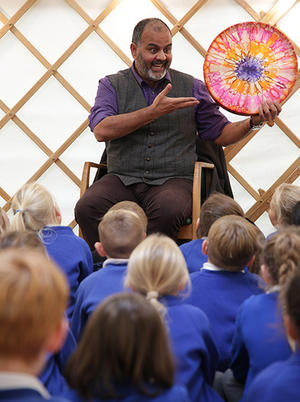Stories are an elemental part of the human condition. From the books we read, to the conversations we have with friends, and even the daydreams we have on a rainy Monday morning, stories help us to make sense of ourselves and the world around us.

We are creatures of narrative, with the power of storytelling hard-wired in to our brains. When we see information on a screen, only that part of our brain that is responsible for language sparks in to life. When we engage with a story, our whole mind - some would argue our entire soul " lights up like an aurora. If I tell you a story about delicious food, your sensory cortex will illuminate. If the story is about a sporting triumph, your motor cortex fires.
Perhaps even more crucially, stories enable us to build bridges between ourselves and those around us. Our minds respond to stories in similar ways, allowing us to develop empathy and understanding, as well as establishing the building blocks of communication; building blocks that form the basis of community and belonging.
The importance of stories in our lives cannot be over-stated. We hear almost annually about the need for children to read more, and as a Professor of International Children's Literature, of course I share this belief. Many children's literature festivals do an excellent job of encouraging and promoting a love of books. But often such festivals and literacy campaigns focus too narrowly on the written word, losing, as they do so, something of the boundless power of storytelling. Stories, after all, are wonderfully diverse in the forms they can take.
At the University of Worcester we have been running a festival of storytelling for children " called Beeline - for a decade now, during which time we have worked with in excess of 10,000 young people. Beeline has attracted many of the biggest names in children's literature, from Michael Rosen and Jacqueline Wilson to Piers Torday and Claudia Boldt, but what is really different is the central focus on stories. So, along with traditional storytellers, we also bring in illustrators, artists, puppeteers, theatre companies and musicians. The idea is to engage children in stories, in the widest sense, through a range of mediums, not just the printed - or indeed the spoken - word, vital though these are.
A couple of years ago we welcomed two children, with their classmates, who had recently come to the UK from Africa. Their knowledge of the English language was limited, but through the power of stories, told through imagery and music, those children found a new way to communicate and to feel fully included.
Beeline emphasises participation and engagement for children as creators and makers, but most of all, as citizens of a society which they are free to shape, share, and build through their stories. The beauty is that this is a process that can break down barriers, be they social, cultural, or ability-based, uniting children through stories.
This year we will have more than 4,500 children participating in Beeline. As a university and as academics, stories are key to our daily lives; we create narratives all the time. If we can inspire children to engage with stories in their broadest sense, we will have found an invaluable ally in the educator's ceaseless quest for insight and understanding amongst those we teach.
We see a lot of stories - in our newspapers, on the TV, on our tablets " about the problems of isolation in the digital age, an issue that has a particularly pernicious effect on young minds, but stories can help. Stories are the antidote to alienation. Many are struggling in an age defined, it would seem, by dislocation and simulation, where who we are is not as important as what we look like, whilst reality drifts past unnoticed. In opening up the boundless horizons of story-telling for children, not only can we hope to give them a means by which they can communicate with each other, share ideas, make connections, and develop understanding, but we can also hope that they may develop the tools with which they can rewrite their own personal narrative and choose their own character.
Jean Webb is Professor of International Children's Literature at the University of Worcester.
The Beeline Festival of Storytelling is taking place at the University of Worcester throughout October.